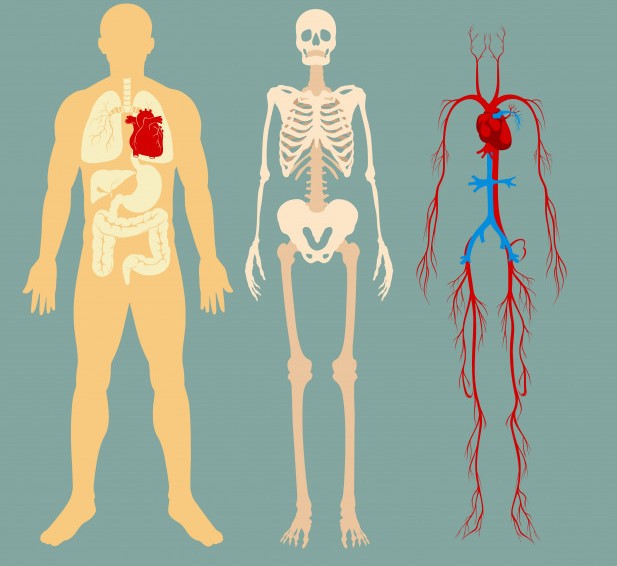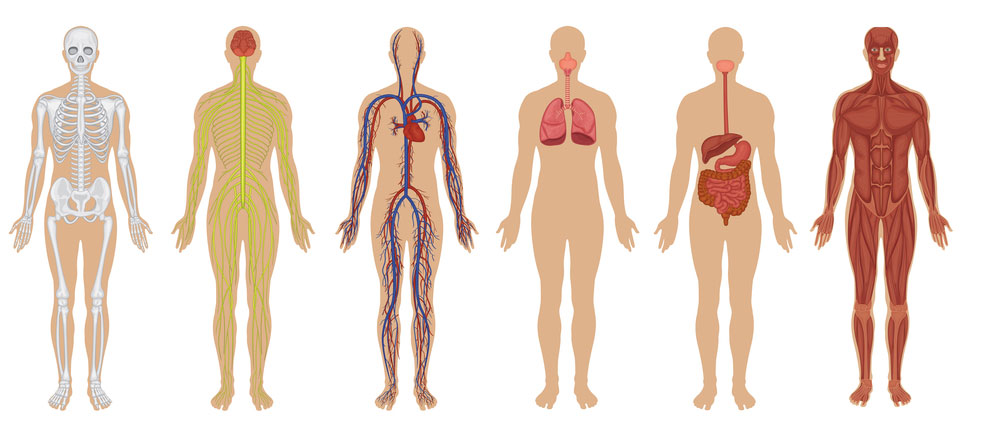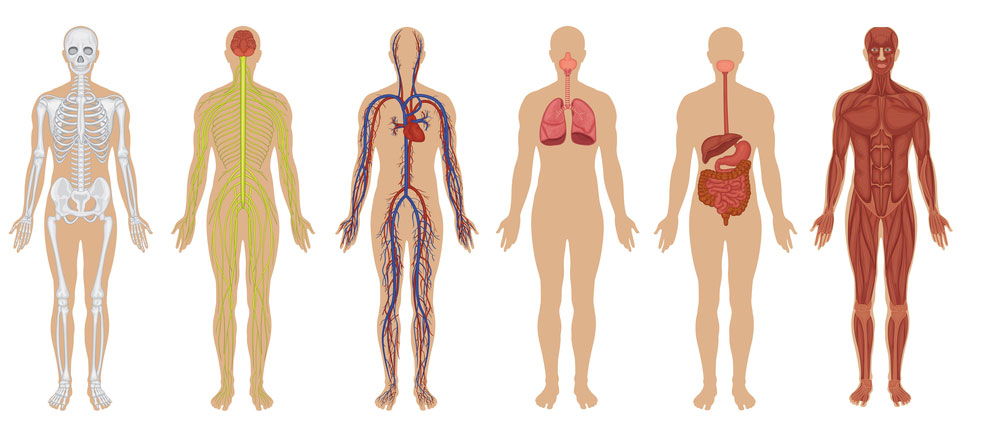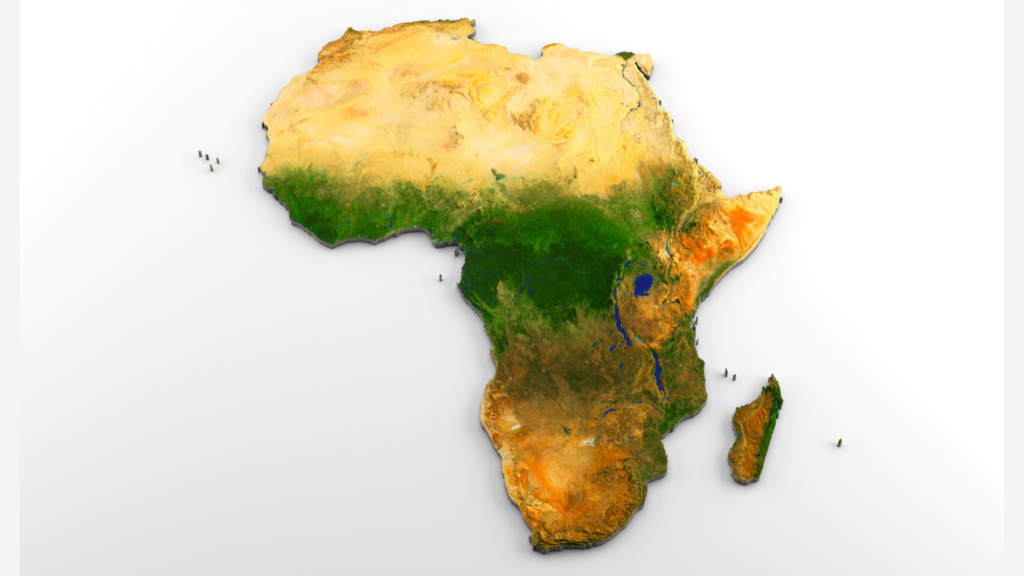The human body is so obvious to every human being that hardly anyone wonders how fascinating it is. Every second our body undertakes thousands of various activities that we are often not even aware of – e.g. digesting a recently eaten meal, rebuilding the epidermis, transporting oxygen from the toes to the very top of the head, and all these are just a handful of amazing properties of our body. It is worth spending a few moments and discovering another surprising facts about the human body, about which you probably had no idea until today.

*Amazing Facts About Human Body**
- The human nose can remember 50,000 different smells.
- Every hour about 600,000 dead cells are exfoliated from the human skin.
- A newborn baby has about 60 bones more than a mature human.
- If all the blood vessels of an adult human were connected into one line, it would be over 160,000. km.
- There is enough iron in the human body that is needed to produce a 7.5 cm long nail.
- The maxillary muscle is the strongest muscle in the human body.
- Sweat has no smell. The bacteria on the skin give it an unpleasant smell.
- People with excessive body hair often have a higher IQ.
- Not only fingerprints, but also the imprint of the tongue is unique to each person.
- The human brain produces enough energy to light a small light bulb.
- People with blue eyes have a higher alcohol tolerance.
- The human eye can distinguish about 10 million colors.
- Ok. 10% of the time you are awake spends your eyes closed anyway – blinking.
- All bacteria in the human body weigh in total about 1.8 kg.
- The heartbeat can follow the rhythm of the music you listen to.
- Human bones are 31% water.
- In human mouth alone there are more bacteria than there are people in the world.
- Every day the human heart produces enough energy to set a truck in motion over 32 km.
- Dead skin cells are the most debris around the bed.
- The human digestive tract, running from the esophagus to the anus, is about 9 meters long.

- A person uses about 200 muscles to perform one step.
- Recorded human body temperature is 46.5 C.
- The heart is not on the left side of the chest but in the middle.
- As many as half of all human genes are responsible for the structure of the brain itself, while the other half of the genes define the remaining 98% of the human body.
- Human tastebuds are replaced with new ones on average every 10 days.
- Despite the widely held belief that hairs that regrow after epilation are thicker and stronger, this has never been scientifically confirmed.
- If the acid in a person’s stomach were to encounter his skin, it would be severely burned.
- Without the little finger, the human hand would lose about 50% of its strength.
- One in 200 people is born with an extra rib.
- Eating too much red meat contributes to premature aging of the body.
- There are 60 of the 118 elements in the Periodic Table (Mendeleev table) in the human body.
- The human brain recognizes sound 10 times faster than blinking an eye.
- The liver has a remarkable ability to regenerate and can rebuild its lost parts (e.g. because of an injury or surgery).
- The human body does not produce enzymes that can decompose some plants, so man cannot eat min. grass.
- The brain consumes as much as 20% of the total oxygen and calories supplied to the body.

- The liver is one of the most fascinating organs. This internal organ can rebuild itself. A fragment of the liver lost, for example, because of an injury, rebuilds itself and the body quickly returns to its lost form.
- Thirteen pairs of ribs? Yes, it is possible! Out of 200 people born, one is born with an extra rib. However, some people decide to remove them.
- The surface of the skin in an adult human can be up to 2 square meters. It is thick and regenerates quickly.
- There are many bacteria on the human body that contribute to the maintenance of bad odors. If you think that a bad smell is caused by sweating, you are wrong. Sweat is odorless, and the bacteria that accumulate it are responsible for its smell.
- The human skull consists of 29 bones.
- Maintaining a normal body temperature is particularly important to avoid serious illness. As much as 80 percent of the heat escapes through the head. There are stories about putting on a hat in winter for a reason.
- Not only the fingerprint is unique. This also applies to the language. The tongue, just like the pads, has its own characteristic and unique pattern.
- Worldwide, only 9 percent of people are left-handed.
- Calcium is essential for the proper functioning of the body. Most, as much as 99 percent, is in the teeth.
- The iron contained in the body would be enough to make a small nail, up to 6 centimeters.
- Human skin is prone to damage; therefore, it can regenerate up to 1000 times during its lifetime.
- A newborn baby has extremely sensitive skin. It is 4 times thinner than an adult.
- The kneecap is a surprising part of the body. It does not appear until the age of 2-5.

- Blue-eyed people are more sensitive to pain. However, they have a greater alcohol tolerance.
- The tongue is the most powerful organ.
- The cornea is the only part of the human body that is not supplied with blood. It draws in oxygen from the environment.
- We burn most calories when we sleep, especially in a cool room.
- During a 24-hour period, the average person speaks around 4,600 words.
- When losing the little finger on the hand, the human hand weakens by 50 percent. We are also unable to perform certain activities. The same is true of the toe. Without a finger, there are problems not only with walking, but also with balance.
- The accompanying cough can reach 90 km / h. There are even studies that confirm that the cough can reach 100 km / h in this case.
- The forearm is the same length as our foot. Take it and see for yourself.
- Closing the eyes is inherent in a sneeze. So, it is impossible to sneeze with your eyes open.
- The mouth contains most bacteria. There are more of them than people in the world.
- During one smile, a person uses as many as 17 muscles. Which is less of a challenge anyway. We use even more when frowning.
- Every 10 days, the taste buds are changed, thanks to this activity we are always able to distinguish a given taste.
- Humans have about 2,000 different taste buds.
- Women blink about 2 times less than men. Human lips are more tender than fingertips.
- The pupils dilate when we look at an object we like or at a person we have a weakness for. While frowning, we use approximately 42 muscles.
- The heart can adjust the heartbeat to the pace of the music you listen to.
- The eye of the average person can distinguish about 10 million different colors, but the brain is not able to provide us with so much information.
- During life, a person can produce about 24,000 liters of saliva.
- About 100,000 chemical reactions take place in the human brain every second.
- For most people, the thumb is the same size as his nose.
- Toenails grow faster than toenails. The process is 4 times faster. It has also been proven that ingrown toenails are hereditary
- At a speed of about 30 yards per second, impulses travel through the human body.

- During the day, an adult person makes nearly 23,000 breaths and of course the same number of exhalations.
- Most cells in the body die and are made up again. Thanks to this, our body regenerates quickly.
- In a minute, a person blinks about 20 times.
- A newborn baby can swallow and breathe at the same time.
- In about 75 years, the human heart makes as many as 3 billion beats.
- Scientists confirmed that in women, the heart beats faster than in men.
- Newborns breathe up to 2 times faster than an adult.
- In spring we breathe twice as fast as in autumn.
- It takes 20 years for the brain to fully develop.
- The left lung is smaller than the right one, all because of the heart which must fit inside the chest.
- Within 7 seconds, the food you eat from the mouth ends up in the stomach.
- During the night, the brain is most active.
- Goose bumps are used to raise the hair to protect the body from the cold.
- The brain absorbs about 20 percent of the energy from a human meal.
- Man does not see his nose all the time, even though it is at eye level. It is all because the brain skips this image so we can see our surroundings.
- Laughter lowers blood pressure. Therefore, the statement laughter is health is true.
- An adult skin weighs about 10 pounds (4 kg).
- The femur is the strongest and most enduring bone. In addition, it can carry 30 times the human weight.
- During death, the first sense that a person loses sight is. The last sense is hearing.
- The nose and ears never stop growing.
- Every ten years, the human skeleton regenerates. Of course, this process does not apply to the teeth.
- The eyes are the only organ that does not grow. So, the eyes are the same size from birth.
- Skin cells only live about 24 hours. Then they are replaced. The dust in the home has been found to be more composed of human skin.
- In one day, a person loses about 200 hairs.
- Neurons grow throughout a person’s life.
- During life, the human heart pumps nearly 180,000,000 liters of blood.
- The human face is divided into two different parts. The position of the eye or the ear is completely different.
- A human can sense a taste in less than half a second, which is less than the blink of an eyelid.

- There are as many as 9 muscles in the human ear.
- A newborn baby has as many as 300 bones in its body. With age, the amount of bones changes. All because of the bones connecting. An adult man has only 206 of them.
- On average, human epidermis is replaced every 27 days.
- A funny situation is not being able to lick your own elbow.
- A woman’s hair is thinner than a man’s, which is why men have stronger and thicker hair than women.
- Women have a better sense of smell than men. Among the population, as much as 2 percent of people have no sense of smell, which can be dangerous to health or life. 98. Men, on the other hand, taste better, hence the stereotype that they cook better than women.
- A left-handed person not only writes with his left hand, but often chews his food with the left side of his jaw. Which, of course, is the opposite of right-handed people who do this with the right side of the jaw.




amazing human body facts, it was really awesome